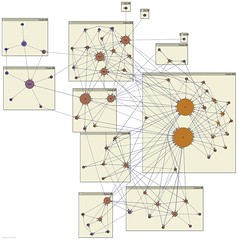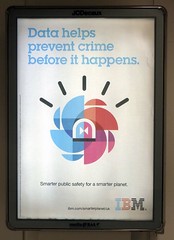March 16, 2013
The privacy of hive minds
 I was interviewed for George Dvorsky's article How Much Longer Until Humanity Becomes A Hive Mind?
I was interviewed for George Dvorsky's article How Much Longer Until Humanity Becomes A Hive Mind?
There is an interesting twist to the privacy issue: is privacy even relevant in a hive mind? Of course, the situation is different if we just use the term to denote a highly connected society. But a complete hive mind would be a single being. Why should there be any need for privacy?
 There are two reasons. The first looks as privacy as compartmentalization. Compartmentalization is important in our own bodies and brains. Everything is *not* connected to everything, but usually in fairly specific ways. Our different mental modules do not completely talk to each other. Looking at brain connectivity matrices show that they are fairly sparse, and indeed seem to have a nonrandom structure. There are no doubt some cross-connections (and synesthetes), but there is not much reason to link the primary visual cortex straight to a motor planning.
There are two reasons. The first looks as privacy as compartmentalization. Compartmentalization is important in our own bodies and brains. Everything is *not* connected to everything, but usually in fairly specific ways. Our different mental modules do not completely talk to each other. Looking at brain connectivity matrices show that they are fairly sparse, and indeed seem to have a nonrandom structure. There are no doubt some cross-connections (and synesthetes), but there is not much reason to link the primary visual cortex straight to a motor planning.
Keeping systems separate makes it easier for them to learn what to actually respond to - a neural network trying to learn a mapping of inputs to a desired output will do it much better if there are no irrelevant input channels. Even the existing cross-connections seem to sometime impair our thinking, like the weird effect where immobilizing one arm makes the other more dexterous or where using TMS to inhibit some cortical areas improve performance. So a unified hive mind might actually not want every unit to be in contact with every other: beside the quadratic bandwidth requirement, most information would be irrelevant and distracting. Modularity and abstraction barriers are great for software and organisations, and no doubt good engineering principles for hive minds.
 Second, privacy is about our desire to control who have access to our information and what they do with it. The problem is that once information is "out there" we lack control. Leaks can happen because somebody breaches trust, but also because apparently innocuous information is inferentially promiscuous and allow others to deduce unintended things, stored information may become accessible in the unknown future, or we do not realize the range of what can be done with it. This has plenty to do with how the actions influence us or our goals, and little with the information itself. So one could argue that in a true hive mind this account of privacy as information control and trust is not needed since all units have aligned interests.
Second, privacy is about our desire to control who have access to our information and what they do with it. The problem is that once information is "out there" we lack control. Leaks can happen because somebody breaches trust, but also because apparently innocuous information is inferentially promiscuous and allow others to deduce unintended things, stored information may become accessible in the unknown future, or we do not realize the range of what can be done with it. This has plenty to do with how the actions influence us or our goals, and little with the information itself. So one could argue that in a true hive mind this account of privacy as information control and trust is not needed since all units have aligned interests.
But that seems to be a big assumption. The "interests" of many parts of our bodies and minds do not seem to be perfectly aligned, yet they participate in the organism. There are selfish genes and genetic components, contradictory drives and plans, and so on. I have a desire to stay healthy in order to achieve various higher order life goals, but my hypothalamus makes me desire fattening food. And if the hive mind comes about due to the gradual merging of previously independent people, it is plausible that many forms of local and group selfishness may be grandfathered in. It is not even clear that it would be better to have perfectly aligned interests: competition is a good method of generating diverse new solutions. The fact that we have multiple goals and shift between them seems to prevent the kind of universalist ruthlessness it is easy to deduce from utility-based AI programs. A hive mind might hence benefit from not having subsystems with goals identical to itself, especially if the top level goals are so complex they are hard to represent by the subsystems.
So privacy might not be exactly dead even in a hive mind world.
March 05, 2013
Knotted whirlpools
 Finally a knotted vortex! Kleckner and Irvine describe in a Nature article how they managed to create a threefoil-shaped vortex by taking a threefoil band and accelerating it. The band has an airfoil cross-section, so when it starts moving it produces a local vortex line. New Scientist has an article and some videos.
Finally a knotted vortex! Kleckner and Irvine describe in a Nature article how they managed to create a threefoil-shaped vortex by taking a threefoil band and accelerating it. The band has an airfoil cross-section, so when it starts moving it produces a local vortex line. New Scientist has an article and some videos.
I have been longing for knotted vortices for years. It all began when I got The Inventions of Daedalus by David Jones. In one of the essays he suggests how to make knotted magnetic fields: sheath a flexible solenoid in superconductor tubing (so field lines cannot cross it). Make a knot on it. Turn on the power: now you have a normal magnetic field between the ends. Now untie the knot. Since the field lines will not intersect and cannot escape the superconductor tube the knot must end up on the magnetic field: between the poles of the solenoid there is now a knotted field.
This was mainly done in jest, of course. But I found it hard to see why it would not work (vector potentials don't have to be conservative). When I brought it up to Göran Grimvall he briefly handwaved it (probably because I, as a student, didn't explain it very clearly). However, it turns out that there are indeed real papers on magnetic knots. And, unsurprisingly, they are not really stable.
Getting a knotted vortex is in a sense the dual to the knotted magnetic field: if you have a knotted wire carrying a current it ought to produce a magnetic field that circulates like the fluid.
March 04, 2013
Criminal imagination
 Is this the real life, is this just fantasy? When should we act against disturbing imagination - I discuss the problems of deducing that somebody is a dangerous person based on their deviant or disturbing imagination.
Is this the real life, is this just fantasy? When should we act against disturbing imagination - I discuss the problems of deducing that somebody is a dangerous person based on their deviant or disturbing imagination.
There is a surprisingly common assumption that people will eventually act out disturbing fantasies they have. If that were true, the murder and rape rate would be astronomical. Part of it is due to evidence bias: serial rapists and killers certainly often have deviant fantasies and it comes to our notice during the court hearings, but a large fraction of normal, law-abiding nice people also have them.
Another idea is that people easily mix up reality and imagination. If that were true we should expect lots of murderous Macbeth actors. Perhaps the form of reality mixing that actually does matter is that hours per week of television viewing correlates with the fear of being a victim of crimes: the bias of media to show newsworthy stories give people availability heuristic bias to think that there is a lot of crime.
In general, we have a very simplified imaginary model of what a criminal is like, fortunately not built on real experience but on fiction. Similarly we tend to overestimate how predictable people are, especially when they are very unlike us. So we tend to overestimate the validity of profiling and underestimate the need of solid non-fantasy evidence.